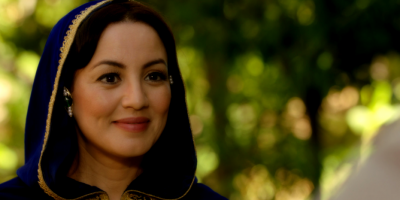“Myopia”: A Universal Message by Morocco’s Film Director Sanaa Akroud’s Latest Screen Gem

This film story by Sanaa Akroud is, like its title “Myopia”, just too simple to carry the power of a deeply moving universal message.
Fatem a hardy woman from a remote Moroccan mountain village is sent on a frivolous mission to the city where she is innocently swept up in a street protest. She finds herself in police custody with no ID and unable to convey what she was doing among the protestors. Six-months pregnant, possibly affected by tear gas from the street riot, she miscarries while being interrogated as a potential political agitator.
The next scene seems to offers redemption: we find Fatem comfortably settled in a hospital bed attended by two social workers. But it soon becomes clear they’re actually from an opposition party with a self-interest in her ‘case’. They abandon Fatem after she doesn’t accept their conditional help. By now the media has been alerted and our reluctant hero, still in the hospital, her bed now bedecked with flowers, is next subjected to an on-camera interview.
Fatem neither protests nor offers the right response to journalists’ attempt to again use the forlorn villager for their own agenda, namely to point to government neglect of rural development. They also suggest that wealthier villagers are exploiting Fatem– that her own home, however dilapidated, could be taken from her. At this point Fatem fights back.
Fatem is played by Sanaa Akroud, also the film’s director. Akroud was in the acclaimed 2011 Egyptian film “Scheherazade”. In “Myopia” she is brilliant as our unsettlingly passive villager, whether inquiring about a letter from an absent husband or when wandering innocently through the city in search of an eyeglass shop. Akroud’s talent climaxes in the penultimate scene where Fatem, under relentless pressure from the journalist, invokes whatever security her humble home provides. In a lengthy monologue, finally pushing back on the sweet-talking city culprits, she liberates herself– at least temporarily. Fatem’s explosion in defense of her personal integrity might remind some viewers of a parallel experience in their own lives.
This story is sure to resonate with many American viewers learning about the depth of racial disparities and the flaws in U.S. democracy where agents of ‘liberal’ society and opposition parties once again reach out to Black and Brown Americans and immigrants with shallow promises of equality and reform.
“Myopia”, perfectly paced for the message it carries, is a beautifully executed film. It is ideal for classroom discussions and for community dialogues. Its U.S. premier is sponsored by the African Diaspora International Film Festival.
*
Note to readers: please click the share buttons above or below. Forward this article to your email lists. Crosspost on your blog site, internet forums. etc.
This article was originally published on the author’s blog site, Barbara Nimri Aziz.
B. Nimri Aziz is an anthropologist and journalist who’s worked in Nepal since 1970, and published widely on peoples of the Himalayas. A new book on Nepali rebel women is forthcoming. She is a frequent contributor to Global Research.
Barbara has just released her new e-book entitled Yogmaya & Durga Devi: Rebel Women of Nepal. Click here for details.
Featured image is from the author

